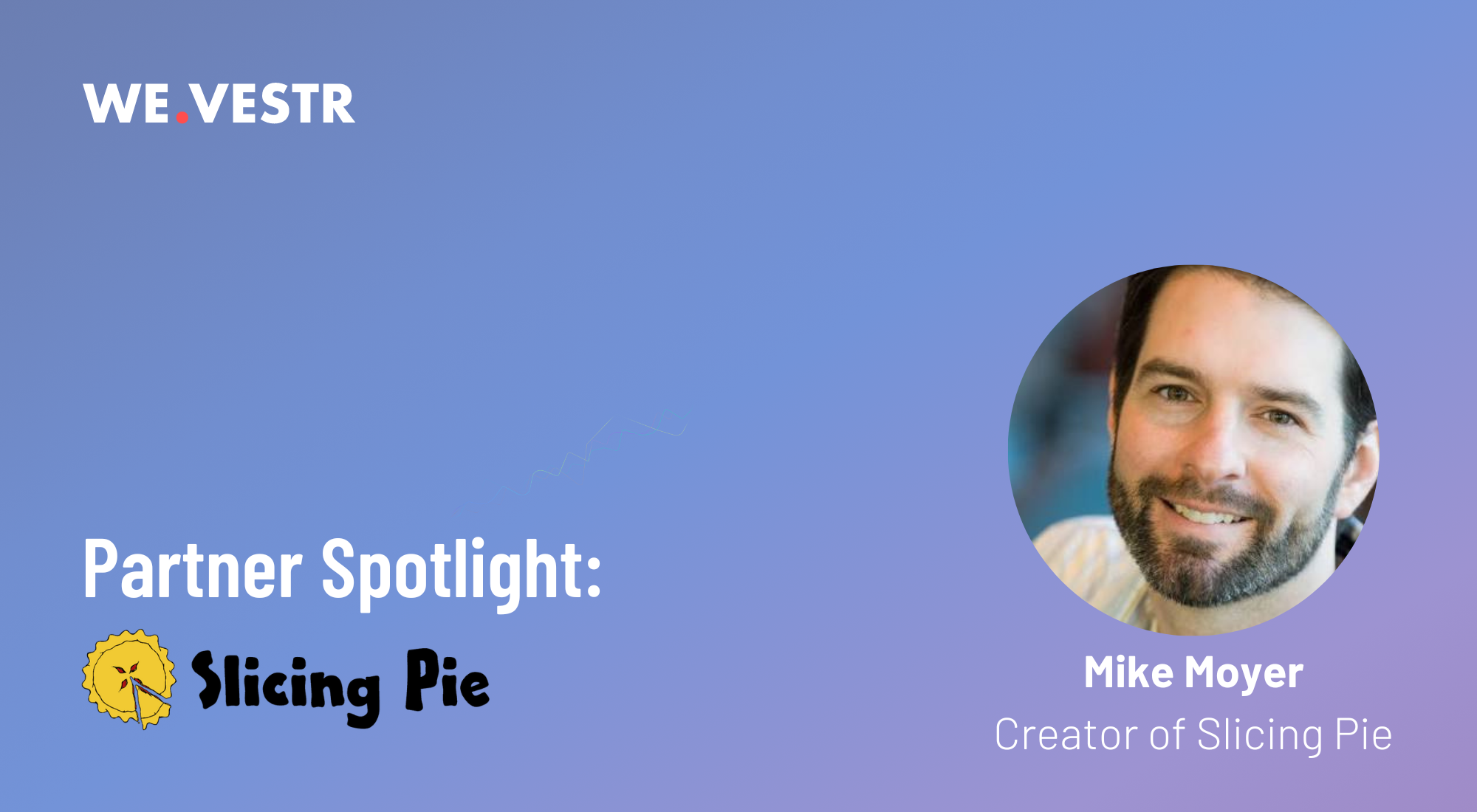Partner Spotlight: Slicing Pie
Get to know our partner and colleague, Mike Moyer, the creator of Slicing Pie and the author of Slicing Pie Handbook. WE.VESTR is the exclusive European licensee of Slicing Pie, as well as big fans of Mike and his work!

With the upcoming launch of the Spanish edition of Slicing Pie, we're excited to see the increased interest, awareness and accessibility of the methodology pioneered by Mike Moyer, creator and author of Slicing Pie, to more European geographies. Check out our full interview with Mike below.👇
Prior to creating Slicing Pie, tell us a bit about your background as an entrepreneur!
I started my first company when I was in college. It was a t-shirt company for sorority and fraternity parties. I created a national catalog and made enough money to pay for college and most of my first master’s degree from Northwestern in marketing.
My experience after that is what led me to the idea of Slicing Pie:
- I joined a post-IPO startup that crashed and burned during the dot-com bust leaving my nice equity package worthless.
- I then returned to get my MBA from The University of Chicago where I won a business plan competition for a startup SaaS that helped veterinarians offset marketing costs. I got into a very convoluted financing deal with a group of investors and nearly bankrupted myself trying to make it work.
- After that setback, I joined yet another startup. This time it was in the automotive industry and we had a nice exit less than a year later. This bounce-back taught how valuable equity ownership could be in a business after a couple of failed attempts.
Eager to jump back into the startup world right away I partnered with an experienced founder to start a lead generation company in the college admissions space. We raised $5 million with a half-written business plan and a PowerPoint deck! I was the president and COO until my cofounder wanted to change direction.
It was then I learned about accelerated vesting which is a common clause in many equity deals. I was satisfied with my share of equity that had great potential. Unfortunately, my cofounder had introduced new operating agreements every time we added new managers to the team. The last one I signed allow him to buy back my fully-vested shares at a tiny fraction of their actual value. A single sentence that cost me dearly.
That bad experience singed my trust for cofounders, and I decided to become a regular old boring employee. I held senior management roles at a private equity-backed sporting goods company, a non-profit senior living management company, and I even ran direct-to-consumer wine sales for a large luxury wine company where I spent a lot of time in Napa Valley wine country.
Despite working for a string of interesting companies, being a regular employee just was not for me. In my spare time I set my mind on solving the equity problem and planning new startups.
Today I own Fair and Square Ventures, LLC which owns Slicing Pie and some of my other publications. I also dabble in angel investing.
I also own MosquitOasis, LLC which makes, among other things, mosquito net tents for summer camps. Between running those businesses and teaching entrepreneurship at Northwestern University, my days are filled!
What are the key problems that Slicing Pie solves?
Before Slicing Pie, startup equity splits were unfair. Simple as that.
I had experienced firsthand how horrible it felt to get burned by bad equity and financing deals. The deals were always unfair because they were either negotiated by people who want to ensure they covered their own butts first, and/or they relied on industry standards. All approaches depend entirely on the accurate predictions of future events.
In a venture capital deal or private equity deal which is mostly cash, you can observe investment amounts, corporate valuation, and market interest rates so you can do the math. In a startup, investment amounts change every day, valuations are zero, regular financing does not apply so negotiations are based on feelings instead of facts. Feelings can range from fear of failure to over-optimism of success.
Slicing Pie works because it applies the basic logic of fairness to everybody by accounting for their actual contributions as opposed to their promises. You cannot negotiate fairness and you cannot predict fairness. You can only observe fairness based on facts.
What about Slicing Pie makes it such a global solution that is usable around the world?
There are a few insights that I gleaned from my experience and research that makes the Slicing Pie model useful anywhere in the world:
First, fairness is a universal construct, and it looks the same in all cultures. If a person’s dad gives them a cookie and tells them to share with their other sibling, the fair choice it to split it exactly in half because they both paid the same amount of nothing to get the cookie. It is impossible to argue that one sibling deserves more than the other. One sibling may not want the cookie, but they have the right to decide what happens to their half.
Imagine the first sibling took a bite of the cookie before splitting it. That is obviously unfair to the other sibling. This is just as true in New York as it is in Amsterdam or Tehran. There is not room for opinions in fairness.
The second reason that Slicing Pie works is because in business the fair market values of everything is observable so we know exactly what each person contributed to a startup’s journey. This is different than other parts of life like, say, criminal justice or parenting which are difficult, if not impossible, to quantify.
Moving ahead with the above analogy, if the siblings paid for the cookie instead of getting it from their dad the percentage each kid paid should decide how much of the cookie each kid gets. If the cookie costs $1.00 the kid who pays $0.75 should get 75% of the cookie. The kid may not want 75% of the cookie, but they get to decide what happens with it. There is nothing about this example that is confusing or ambiguous. There is only one way of looking at it (unless you make up facts that are not in the example_.
The third insight that makes Slicing Pie work is the recognition of two basic types of contributions: cash and non-cash. I mentioned above that everything has a fair market value, but $50 of someone’s time is not the same thing as $50 of someone’s cash. Slicing Pie uses multipliers that normalize the contributions of each person. This accounts for the differences and aligns incentives for all participants.
I often remind people that although I’m the inventor of Slicing Pie, I am not the inventor of fairness. My job is simply to provide the tools that can allow founders to uncover the fair answer.
If there's one piece of advice you would give all founders, what is it?
Startups are hard work and there are lots of ups and downs. Chances are good that you will walk away with nothing. You should strive to make them fun too. If they are fair, they will be fun. Everyone will succeed or fail together because they are all in the same boat. If the startup is unfair people will take notice and the business will stop being fun.
I once knew a guy who was a retired customer service rep at an automotive company. He was one of the first employees in an automotive startup. A few years later exited with over $5 million. He was rich beyond his wildest dreams…and he was irate. His cofounder made over $350 million. The deal was not fair. Your equity split will not determine success of your company, but it will determine how you personally experience success!
Oh yeah…I also tell founders to concentrate on generating revenue! You are probably going to be nothing without it.
